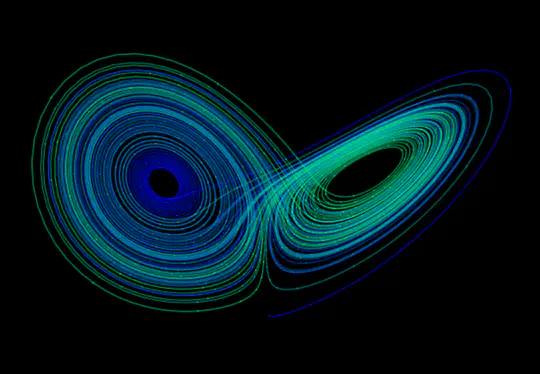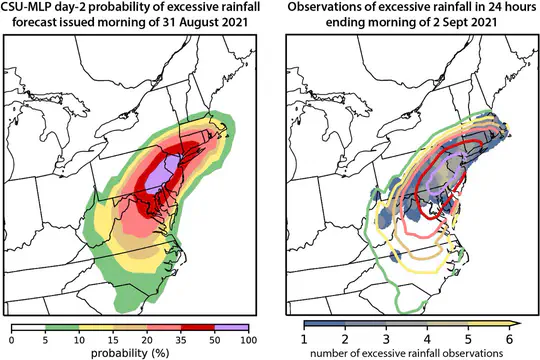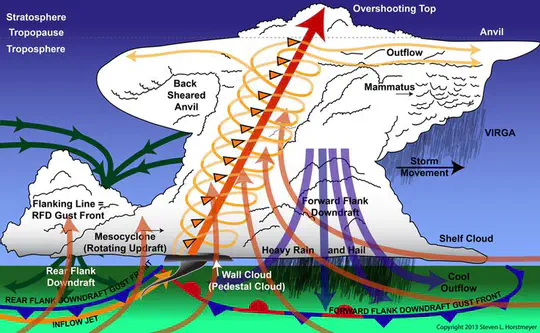Biography
Dr. Aaron Hill is a professor of meteorology in the School of Meteorology at the University of Oklahoma. His research interests include weather forecasting, data assimilation, numerical weather prediction, predictability of severe convective weather, artificial intelligence and machine learning, Python programming, innovative observing systems, and operational weather forecasting tools. Dr. Hill leads the CHAOS research group which specializes in Convection and weather Hazards with Artificial intelligence, Observations, and Simulations. The group is currently involved in developing machine learning tools for high-impact weather forecasting, exploring predictability of storms in warming climates, and understanding the dynamics of tornadogenesis in Quasi-Linear Convective Systems. Interested in joining the CHAOS group? Contact Dr. Hill: ahill@ou.edu
- Numerical Weather Prediction and Weather Forecasting
- Artificial Intelligence, Machine Learning, and Data Science
- Severe Storm Dynamics
PhD in Geosciences, 2019
Texas Tech University
MS in Atmospheric Science, 2014
Texas Tech University
BS in Atmospheric Science; Minor in Applied Mathematics, 2012
University of Washington
Group Announcements
08/01/2025
Congratulations to Christian McGinty for winning a presentation award for his poster on TORFF outlooks at the recent AMS Mesoscale conference! Hanna McDaniel and Kelly Geiger also presented their M.S. work at AMS Mesoscale for their first graduate school conference presentations!
In July, Evan White became the first student in the CHAOS group to submit a manuscript to a science journal, AIES - Evan’s project on postprocessing AI weather prediction models adds to a growing list of prediction systems for severe weather hazards.
Our summer REU student Ian Shank presented his final REU project in late July before we had to say goodbye for the summer. Ian completed an in-depth quantitative analysis of machine learning-based forecasts of severe weather and their utility at extended ranges.
05/22/2025
This summer, Ian Shank from UNC Charlotte will be an REU student in the group! Ian will be evaluating machine learning forecasts of severe weather to generate additional statistics and value for our operational partners.
04/25/2025
Welcome Mandy Voth and Braelyn Long to the group, two new undergraduate researchers! Both will be working on understanding the environmental evolution preceeding tornadogenesis with QLCS mesovortices.
Experience
Classes taught:
- METR 4970/5970: Numerical Weather Prediction (Fall 2025)
- METR 1313: Introduction to Programming for Meteorology (Spring 2024, 2025)
- METR 5970: AI for Environmental Science (Fall 2024)
Research Areas
Recent Publications
Recent Presentations
Full list of presentations here
McClung, B. T., D. Schvartzman, A. J. Hill, M. Stock, and A. McGovern, 2025: BoltCast: Deep Learning for Long Term Lightning Prediction. 12th Conference on the Meteorological Application of Lightning Data, New Orleans, LA.
Clark, A., A. J. Hill, K. Hoogewind, A. Berrington, and E. Loken, 2025: Extended range machine-learning severe weather guidance based on the operational GEFS. 33rd Conference on Weather Analysis and Forecasting, New Orleans, LA.
Erickson, N., A. McGovern, and A. J. Hill, 2025: Deep Learning for Short-Term Characterization of Tornado Intensity. 24th Conference on Artificial Intelligence for Environmental Science, New Orleans, LA.
Hill, A. J., D. J. Bodine, S. M. Cavallo, B. G. Ilston, Z. J. Lebo, and D. Schvartzman, 2025: Preparing the Next Generation of Meteorological Data Scientists: Redesigning Curricula for Student Success. 34th Conference on Education, New Orleans, LA.
Hill, A. J., E. White, and J. Radford, 2025: An AI-Machine Learning Probabilities (AI-MLP) Forecast System for Hazardous Weather Prediction. 33rd Conference on Weather Analysis and Forecasting, New Orleans, LA.
Hill, A. J. and R. S Schumacher, 2025: Machine Learning Probability Ensembles for Medium-Range Excessive Rainfall Prediction. 24th Conference on Artificial Intelligence for Environmental Science, New Orleans, LA.
Madsen M., A. McGovern, D. Harrison, A. Clark, M. Baldwin, S. Ernst, J. T. Ripberger, and A. J. Hill, 2025: Perceptions and Performance of Global AI Models in the 2024 NOAA Hazardous Weather Testbed. 24th Conference on Artificial Intelligence for Environmental Science, New Orleans, LA.
Schumacher, R. S. and A. J. Hill, 2025: Quality-controlled databases of US extreme rainfall events based on gridded precipitation estimates and convection-permitting model output. 39th Conference on Hydrology, New Orleans, LA.
Contact
- ahill@ou.edu
- 120 David L. Boren Blvd Suite 5900, Norman, OK 73072


